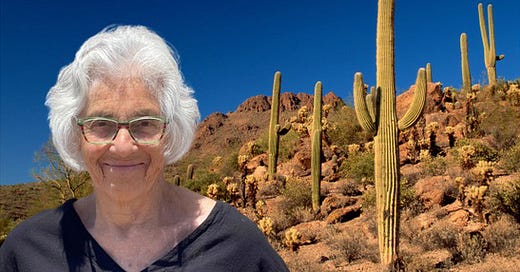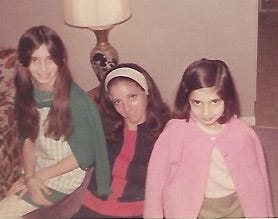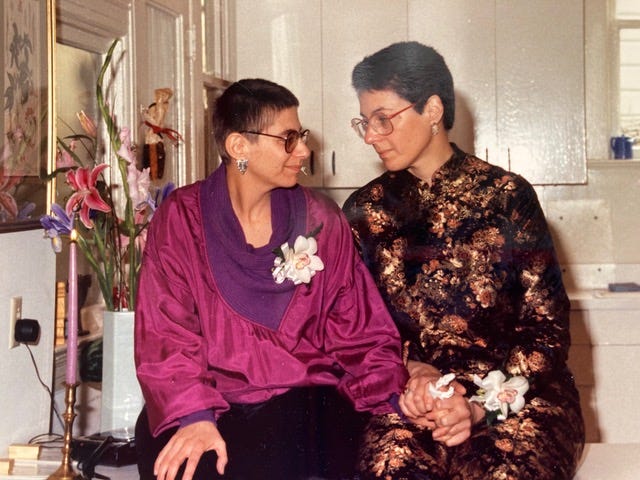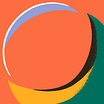Sandra Butler: Jewish, Queer, and Unstoppable
The 86-year-old author's fifth book comes out in October
Sandra Butler has written four books. You can read an excerpt from her fourth book, “The Kitchen is Closed: And Other Benefits of Being Old” on Oldster. Her work has appeared in Psychology Today, Motherhood Later…than Sooner, Writer’s Digest, and Better After 50.
Her “Old, Jewish, Queer” nametag caught my eye at the 2023 Tucson Festival of Books. Her fifth book, “Leaving Home at 83,” is being released on October 15, 2024 by Rattling Good Yarns Press. I interviewed Sandra recently and here’s her story.
As a girl, I was a shy, nerdy, bookish kid. Having always been a reader turned out to be the best precursor to my becoming a writer.
I married at eighteen as a way of leaving home after having been thrown out of University for "consorting with undesirable elements," in the language of the l950s. But I was too young, the times were too conventional, and we divorced after seven years and two daughters.
I moved with my kids to Greenwich Village. I became involved in the anti-war movement and dragged my daughters like tin cans on the back of a car to demonstrations, meetings, and rallies—teaching them my values of justice where possible and resistance when necessary.
In l970, after Nixon was elected, in a failed attempt to convince my daughters to move to Vancouver, where there was a large expatriate community, I was repeatedly voted down. One man, one vote was the language of the times and of my little threesome. They wanted to live near Haight and Ashbury and meet the Grateful Dead. I yielded to their enthusiasm, and we moved to the Bay Area, where I lived for the next fifty years.
I returned to college for the second time, which proved more successful. I started thinking about writing toward the end of college when I had to turn in a final term paper about what I had learned. By the early 1970s, second-wave feminism was taking hold, scattered in all directions. There were bookstores, publishing companies, women in the trades, separatists, liberals, Marxists, and those of us who focused on the roots and the results of violence against women.
Incest wasn't being talked about. There was tremendous silence in the mid-1970s, and the weight of that silence fell directly on the survivors. I needed to tell their stories. It turned out that I was five minutes ahead of the cultural awareness surrounding sexual assault with my first book, “Conspiracy of Silence: The Trauma of Incest.” Understanding how power and control worked was exploding in those early days, and I was swept along with the tide. It became my life's work for the next 10 years. I held survivor groups for many years to create the opportunity for women to be in community to best address their collective wounds.
My partner Barbara was a significant figure for my daughters during this time. We were together for 11 years---not long enough. When we learned she had breast cancer, Barbara filed a lawsuit because, at the time, radiologists had seven seconds to read a mammogram. The tumor should have been caught earlier. We won the lawsuit, and the settlement allowed us to spend the last three years of Barbara's life together.
During that time, we wrote the book, “Cancer in Two Voices.” We had the political responsibility to write about it because, again, breast cancer wasn't something people talked about then. We each wrote our own sections. Barbara was an academic, so the book was written in a research-oriented way. We wrote our sections separately and didn't comment on each other's work. I had to finish the book after she passed, which was very difficult.
I went on the road again to advocate for women's health. The air we breathe, the water we drink, and the food we consume are filled with environmental toxins, and our reproductive organs are most vulnerable to breast and ovarian cancers.
It was important to me to help lesbian and heterosexual couples speak honestly to one another in a health crisis. I had women dragging their husbands to my sessions so they could hear what they needed to do to support their wives.
I've been in a women's group that started right after Barbara died. We used to be called The Wandering Menstruals. Now, 35 years later, we're the Mennies and meet every month for three hours. Often, the topic of conversation was about our daughters, their choices, and the need to recalibrate our relationships. A group member suggested we write a book and interview mothers about their mothering experience as they and their daughters aged.
“It Never Ends: Mothering Middle-aged Daughters” was the result of talking to seventy-five women about their relationship with their daughters. The result was more melancholy than I would have thought. Women talked about the loss of contact and not seeing enough of their daughters or feeling known by them.
My daughters are straight, middle-aged, and my relationship with them is, at long last, glorious. I don't hold back. I say everything to them and invite them to tell me everything.
My older daughter is 66, and I recently attended her first book launch party in Phoenix. It was so exciting to have another author in the family! Kendall Hunt Publishing published her book, “Choreographing Your Dance Career,” on March 25, 2024.
My younger daughter is 64. She was a PhD Economist, but when she reached 50, she left the field and became a death doula now working in Washington D.C.
Having a strong, powerful, public mother wasn't easy for them. They wanted and needed a more milk-and-cookie mom, leaving them with a confusing combination of pride and loss. It wasn't until they came into their own strengths and fullness that our relationship blossomed.
“The Kitchen is Closed: And Other Benefits of Being Old,” published in 2022, was my COVID book, a series of short, funny essays about some unsaid truths about aging.
My younger daughter came out to the Bay Area three years ago to support me when I was diagnosed with lung cancer. After my surgery and a month of her painstaking caretaking, she left to return to her home and her life and I was left with a new vulnerability, one that would only be assuaged every six months when I would be scanned for a recurrence of my cancer. My closest women friends were all facing their own health challenges, and I was overcome with a longing to be cared for, attended to, looked after. In an anxious impulse, I moved to an independent living residence in Phoenix to be near my daughters. That's the topic of “Leaving Home at 83,” focused on my struggle to balance autonomy and independence with a growing longing to be taken care of, which I try not to fight against.
I'm in Tucson now, working on my next book, which will be called, “Now What: Field Notes from the Front Lines of Old Age.”
I'm an old lesbian who writes. I've been in a relationship with words my whole life. It's what I do and who I am.















Omg I want to meet her!
What an inspiration!